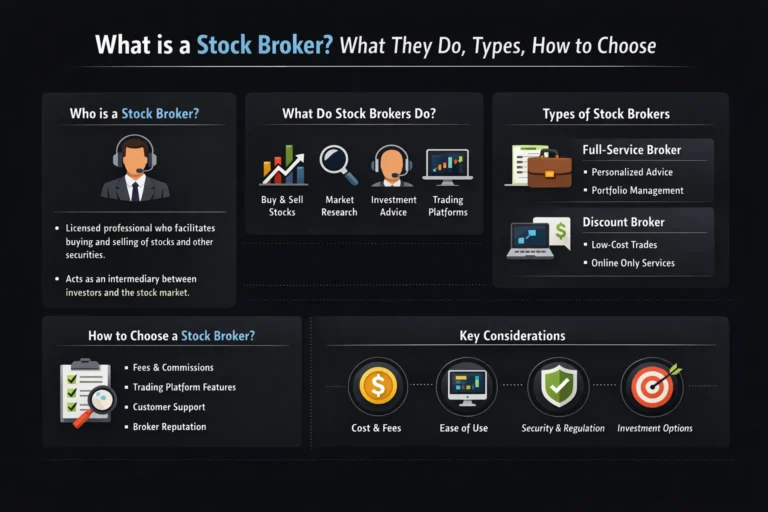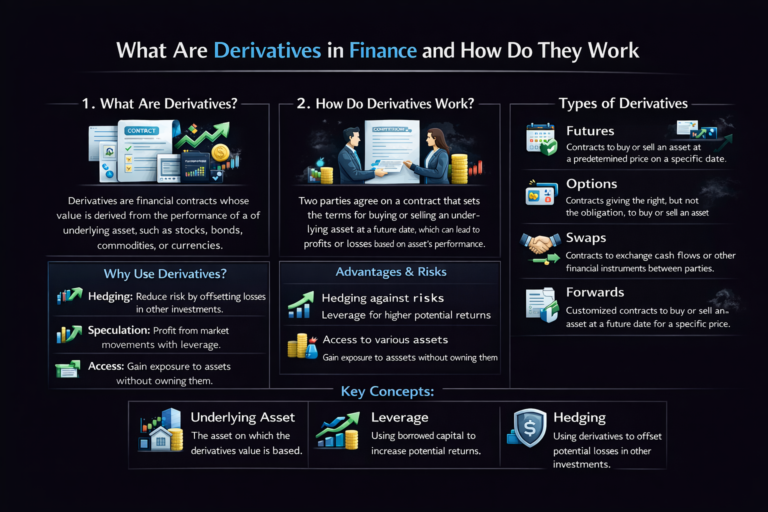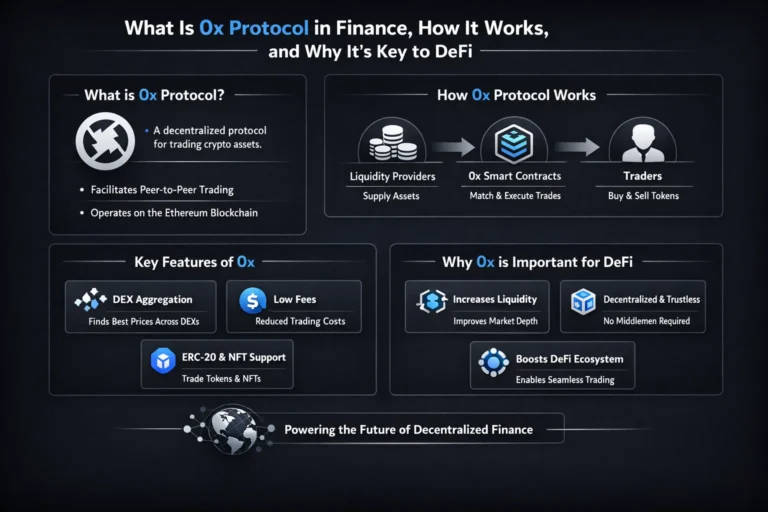
What Is Certificate of Deposit, Is It a Good Investment
A Certificate of Deposit (CD) is a cornerstone of conservative personal finance, offering a secure, fixed-interest savings product provided by banks and credit unions. It’s a time deposit where you agree to lock away funds for a predetermined period in exchange for a guaranteed, typically higher, rate of return than a regular savings account. For savers in the US, UK, Canada, and Australia looking for predictable returns with Federal Deposit Insurance Corporation (FDIC) or equivalent protection, CDs are a fundamental tool for preserving capital and earning interest income with minimal risk.
Summary Table
| Aspect | Detail |
|---|---|
| Definition | A time-bound savings account with a fixed interest rate and maturity date, offered by banks and credit unions. |
| Also Known As | Time Deposit, Term Deposit |
| Main Used In | Personal Savings, Retirement Planning, Emergency Funds, Conservative Portfolio Allocation |
| Key Takeaway | CDs offer a safe, predictable return with principal protection, making them ideal for short-term goals and risk-averse savers, but limit liquidity. |
| Formula | N/A (Feature-based product) |
| Related Concepts |
What is a Certificate of Deposit (CD)
A Certificate of Deposit is a savings contract between you and a financial institution. You deposit a lump sum of money for a fixed term—anywhere from one month to ten years—and the bank pays you a guaranteed interest rate that is typically higher than what’s offered on standard savings accounts. In exchange for this premium, you agree not to withdraw the funds until the maturity date. If you need the money early, you’ll usually pay an early withdrawal penalty, which can eat into your principal. Think of it as lending money to the bank for a set period; they reward your commitment with better terms. This makes CDs a classic example of the risk-return tradeoff in a low-risk context: sacrifice some liquidity for greater, guaranteed returns.
Key Takeaways
The Core Concept Explained
At its heart, a CD is a low-risk savings vehicle designed to generate interest income with near-absolute certainty. The mechanics are straightforward: you deposit funds, the bank applies a fixed interest rate for a fixed term, and at maturity, you receive your original principal plus the accrued interest. The key variables are the APY, the term length, and the penalty structure. A higher APY is the reward for committing to a longer term and forgoing liquidity. This trade-off is central to the product. For instance, a 5-year jumbo CD (a CD requiring a large minimum deposit, often $100,000) will typically offer a higher rate than a 6-month standard CD. The interest can be paid out periodically (monthly, quarterly) or compounded and paid at maturity.
How to Calculate CD Returns
While there’s no single formula defining a CD as a concept, the return on your investment is calculated using the standard formula for compound interest. The most important figure to understand is the Annual Percentage Yield (APY), which reflects the total amount of interest you will earn on your deposit over a year, taking into account the effect of compounding.
The core formula is: Future Value = Principal × (1 + APY/n)^(n×t)
Step-by-Step Calculation Guide
Let’s break down the components with an example relevant for savers in the US or Canada:
- Principal (P): The initial amount deposited (e.g., $10,000 USD).
- Annual Percentage Yield (APY): The advertised annual rate, inclusive of compounding (e.g., 5.00% or 0.05).
- Number of compounding periods per year (n): How often interest is calculated and added to the principal (e.g., daily (365), monthly (12), quarterly (4)).
- Time in years (t): The length of the CD term (e.g., 3 years).
Example Calculation: A 3-year, $10,000 CD at 5.00% APY compounded daily.
- Input Values:
- P = $10,000
- APY = 5.00% = 0.05
- n = 365 (daily compounding)
- t = 3
- Calculation:
- First, calculate the periodic rate:
APY/n = 0.05/365 ≈ 0.00013699 - Then, calculate the total number of compounding periods:
n × t = 365 × 3 = 1095 - Apply the formula: Future Value = $10,000 × (1 + 0.00013699)^1095
- Future Value ≈ $11,618.05
- First, calculate the periodic rate:
- Interpretation: At maturity, your initial $10,000 investment will have grown to approximately $11,618.05. You will have earned $1,618.05 in total interest. This demonstrates the power of compound interest, even in a simple, safe product like a CD.
Why Certificate of Deposit Matters to Traders and Investors
While traders chasing alpha might overlook CDs, they play a critical role in holistic financial planning and portfolio management.
- For Conservative Investors & Savers: CDs are a bedrock of capital preservation. They provide a safe harbor for cash that cannot afford any risk of loss, such as emergency funds (in a ladder), short-term savings goals, or a retiree’s income supplement. The FDIC insurance (up to $250,000 per depositor, per insured bank, per ownership category in the US) or NCUA coverage for credit unions makes them arguably one of the safest places to park cash outside of Treasury securities.
- For Portfolio Managers: CDs can act as a stabilizing, low-correlation asset within a broader portfolio. They provide predictable cash flows and can be used to match future liabilities. In a rising interest rate environment, a CD ladder strategy (explained below) becomes a dynamic tool for capturing higher yields over time.
- For Financial Planning: The certainty of a CD is its superpower. Knowing exactly how much money you will have on a specific future date is invaluable for planning a major purchase, funding an education, or managing known future expenses. It removes market guesswork.
The Strategic Role of CDs in a Rising Rate Environment
While the principal protection of CDs is their primary appeal, savvy savers can use them strategically, especially during changing monetary policy cycles. Understanding how CDs function within different interest rate environments transforms them from passive savings vehicles into active portfolio tools.
Understanding the CD Yield Curve
Much like bonds, CDs have their own yield curve—the relationship between term lengths and interest rates offered. Typically, longer terms command higher yields to compensate for the extended commitment. However, during periods when the Federal Reserve or other central banks are expected to raise rates, the curve can flatten or even invert, with short-term CDs offering comparable or better rates than long-term ones.
- Normal Environment: 5-year CD rate > 2-year CD rate > 6-month CD rate.
- Rising Rate/Inverted Environment: 6-month CD rate ≥ 2-year CD rate > 5-year CD rate.
Tactical Moves for Different Environments:
- When Rates Are Rising (e.g., 2022-2023): This is the time for short-term CDs (3-12 months) or “bump-up” CDs. Avoid locking into long-term rates, as you’ll miss out on better yields in the near future. A CD ladder with shorter initial rungs (e.g., 3-month, 6-month, 9-month) allows you to reinvest frequently at higher rates.
- When Rates Are Peaking or Expected to Fall: This is the ideal moment to “lock and load” with longer-term CDs (3-5 years). If you believe rates have reached their zenith, securing a high yield for an extended period guarantees that return even as market rates decline. A “callable” CD here is risky, as the bank would likely call it back if rates fall.
- When Rates Are Low and Stable: Focus on maximizing yield through credit union CDs (which often offer better rates) or jumbo CDs if you have the capital. This is also when shopping for high-yield savings accounts or money market funds becomes crucial for comparison, as the premium for locking money up may be minimal.
The Inflation Hedge Question:
CDs are poor direct hedges against high inflation. However, in a moderating inflation environment where real rates (nominal rate minus inflation) become positive, CDs start to preserve and grow purchasing power effectively. Monitoring the Consumer Price Index (CPI) reports alongside CD rates can inform timing decisions.
Actionable Insight: Before opening any CD, check the current Treasury yield curve and Fed statements. If the narrative is “higher for longer,” consider a ladder. If it’s “peak rates ahead,” consider extending your longest rung. Resources like the CME FedWatch Tool can provide market expectations for future rate moves.
How to Use Certificates of Deposit in Your Strategy
Beyond simply buying a single CD, strategic use can optimize returns and manage liquidity.
- Case 1: Building a CD Ladder. This is the premier strategy for mitigating interest rate risk and maintaining regular liquidity. Instead of investing one large sum in a single long-term CD, you divide the money into equal parts and invest in CDs with staggered maturity dates (e.g., 1-year, 2-year, 3-year, 4-year, 5-year CDs). As each CD matures annually, you reinvest the proceeds into a new 5-year CD at the prevailing rate. This creates a rolling ladder that gives you access to a portion of your money every year while capturing longer-term rates on most of your portfolio.
- Case 2: Parking Funds for a Known Future Expense. If you know you’ll need $25,000 for a down payment in 18 months, shopping for the best 18-month CD rate ensures that money grows safely and is ready precisely when you need it, avoiding the temptation or risk of investing it in the volatile stock market.
- Case 3: Using “No-Penalty” or Bump-Up CDs. For uncertain times, these specialized CDs offer flexibility. A no-penalty CD allows you to withdraw your full principal and interest before maturity without a fee, often after a short initial holding period (e.g., 7 days). A bump-up CD allows you to request a single rate increase if the bank’s offered rates go up during your term. These are useful when you suspect rates might rise but want to secure some yield immediately.
How to Shop for and Open a CD Like a Pro
Knowing about CDs is one thing; efficiently finding and opening the best one is another. This walkthrough ensures you get the optimal product without hidden surprises.
Phase 1: Research & Comparison (The 30-Minute Audit)
- Aggregate to Save Time: Don’t visit individual bank sites first. Start with comparison sites like Bankrate, NerdWallet, or DepositAccounts. Filter for your desired term and sort by APY.
- Segment Your Options:
- Online Banks/Brokers: (e.g., Ally, Marcus, Vanguard Brokered CDs). Typically offer the highest national rates due to lower overhead. Ideal for most savers.
- Local Credit Unions: Often have competitive “relationship rates” for members. Check eligibility requirements.
- Traditional National Banks: (e.g., Chase, Bank of America). Convenient but usually offer the lowest “promotional” rates. They profit from customer inertia.
- Read the Fine Print (The Critical Step):
- Minimum Deposit: Ranges from $500 to $10,000+. Ensure you meet it.
- Early Withdrawal Penalty (EWP): This is key. It’s usually a period of interest (e.g., “3 months simple interest” for a CD under 1 year; “6 months interest” for 1-5 years). Calculate what this would cost you.
- Compounding Frequency: Daily or monthly compounding will yield slightly more than annual compounding at the same APY.
- Auto-Renewal Policy: Most CDs renew automatically. Note the grace period (usually 7-10 days after maturity) where you can withdraw or change terms without penalty. The renewal rate is often much lower.
- Interest Payout Options: Can it be transferred to an external account monthly, or is it all reinvested?
Phase 2: The Account Opening Process
- Gather Documents: Have your government-issued ID (driver’s license, passport), Social Security Number (or equivalent), and funding account details (routing and account number) ready.
- Initiate Application: Complete the online application or visit a branch. You’ll need to provide personal information and designate beneficiaries—don’t skip this crucial estate planning step.
- Fund the CD: This is typically done via an ACH transfer from your linked checking or savings account, which can take 1-3 business days. Some institutions allow wire transfers for immediate funding (for a fee).
- Confirm & Save: Once opened, you should receive a CD disclosure statement or account agreement. Save this digitally. Note your maturity date in your personal calendar.
Phase 3: Ongoing Management & At Maturity
- Track Your CD: It should appear in your online banking dashboard. Set a reminder for 2-4 weeks before the maturity date.
- The Grace Period Decision: When you receive the maturity notice, you have a short window to decide: Withdraw, Renew, or Change Terms. Do not let it auto-renew without checking current rates. If you do nothing, it will renew at the (likely inferior) posted rate.
- Tax Documentation: Expect a Form 1099-INT (US) or equivalent tax statement in January for the interest earned in the previous year.
Consider opening your CD at an institution where you already have a checking account for easier tracking and transfers. However, don’t let convenience cost you 0.50% or more in APY.
- Safety & Protection: Backed by government insurance (e.g., FDIC, NCUA), making them virtually risk-free from loss of principal.
- Predictable Returns: The fixed interest rate eliminates uncertainty; you know your exact return at maturity.
- Higher Rates: Typically offer better APY than traditional or even many high-yield savings accounts.
- Disciplined Saving: The early withdrawal penalty enforces savings discipline, helping you stick to financial goals.
- Diversification: Provides a stable, low-volatility component to a diversified investment portfolio.
- Liquidity Lock: Accessing funds before maturity triggers a penalty, potentially erasing interest or cutting into principal.
- Interest Rate Risk: Locked into a lower yield if market rates rise, creating significant opportunity cost.
- Inflation Risk: Fixed returns may not keep pace with inflation, eroding purchasing power over time.
- Capped Returns: Growth potential is limited and often lags behind riskier assets like stocks over the long term.
- Reinvestment Risk: At maturity, you may be forced to reinvest your principal at lower prevailing interest rates.
Certificate of Deposit in the Real World: A Strategic Response to Rising Rates
The period from 2022 to 2024 provides a perfect case study. As central banks like the Federal Reserve and the Bank of England aggressively raised interest rates to combat inflation, CD rates soared from historic lows. Savvy savers who had been earning negligible interest in standard accounts suddenly had an opportunity.
In early 2022, a UK saver with £50,000 in a cash ISA earning 0.5% might have moved that capital into a 2-year fixed-term bond (the UK equivalent of a CD) offered by a high-street bank like Barclays or an online challenger bank, locking in a rate of 3.5%. By 2023, as the Bank of England’s base rate continued to climb, new 2-year CDs were being offered at over 5.0%. Investors using a CD ladder strategy were positioned to capture these higher rates as their shorter-term CDs matured and were reinvested. This period highlighted the importance of not “setting and forgetting” cash holdings and actively shopping for the best term deposit rates in a changing monetary environment.
Beyond the Bank: Exploring Brokered CDs and IRA CDs
For those looking to optimize yields or integrate CDs into tax-advantaged retirement planning, the landscape extends beyond your local bank’s website.
Brokered CDs: Liquidity and Choice
Purchased through investment brokerage firms like Fidelity, Charles Schwab, or Vanguard, brokered CDs offer distinct advantages and complexities.
How They Work: The brokerage acts as an intermediary, aggregating CDs from hundreds of banks across the country. You buy them through your brokerage account, similar to buying a bond or stock.
Advantages:
- Wider Selection & Competitive Rates: Access to CDs from institutions nationwide you wouldn’t otherwise find, often with very competitive rates.
- Secondary Market Liquidity: This is the biggest differentiator. You can sell a brokered CD before maturity on a secondary market to another investor. You aren’t forced to accept the bank’s early withdrawal penalty, though you may sell at a loss or gain depending on interest rate movements.
- Convenient Holding: All your CDs are held alongside your other investments in one brokerage account statement.
Disadvantages & Risks:
- Market Price Fluctuation: Because they can be traded, the market value of your brokered CD will fluctuate with interest rates. If you must sell when rates are up, you’ll likely sell at a discount. Your principal is only guaranteed if held to maturity.
- Call Risk Amplified: If a callable brokered CD is called by the issuing bank, you receive par value, but you may then have to reinvest at lower rates. The call feature is often priced into a slightly higher yield.
- FDIC Insurance Still Applies: The CD is still issued by an FDIC-member bank, so your principal (up to limits) is safe if the issuing bank fails, not if your brokerage fails.
IRA CDs: The Retirement Safe Haven
Holding a CD within an Individual Retirement Account (IRA) combines tax efficiency with safety.
- Traditional IRA CD: Contributions may be tax-deductible. Interest grows tax-deferred. Withdrawals in retirement are taxed as ordinary income. Subject to Required Minimum Distributions (RMDs) starting at age 73.
- Roth IRA CD: Contributions are made with after-tax dollars. Interest grows tax-free, and qualified withdrawals in retirement are completely tax-free. No RMDs during the owner’s lifetime.
Strategic Use in Retirement:
- The “Bond Tent” or “Safe Bucket”: As retirees approach and enter retirement, allocating a portion of their IRA to CDs can provide predictable income to cover essential expenses, reducing sequence-of-returns risk from the stock portfolio.
- Laddering within an IRA: Creating a CD ladder inside an IRA can generate a predictable, rolling stream of income that can be automatically transferred to a checking account or reinvested.
- Considerations: IRA contribution limits apply ($7,000 for those under 50, $8,000 for 50+ in 2024). Early withdrawal penalties from the CD itself would still apply, plus possible IRS penalties for early IRA distributions.
Certificate of Deposit vs High Yield Savings Account
CDs sit within a spectrum of cash and cash-equivalent products. Understanding the differences is key to choosing the right tool.
| Feature | Certificate of Deposit (CD) | High-Yield Savings Acct. (HYSA) |
|---|---|---|
| Primary Purpose | Guaranteed growth for a fixed period. | Liquid savings with a competitive yield. |
| Interest Rate | Fixed for the entire term. | Variable, can change at any time. |
| Liquidity | Low (early withdrawal penalty). | High (easy withdrawals, often limited transactions). |
| Best For | Known future expenses, locking in rates. | Emergency funds, short-term cash parking. |
| Risk | Interest rate & inflation risk. | Rate fluctuation risk. |
Conclusion
Ultimately, a Certificate of Deposit is not a growth engine for wealth creation but a foundational tool for capital preservation and predictable income. It serves as the secure, stable pillar in a financial plan, ideal for short-to-medium-term goals and the conservative portion of any portfolio. As we’ve seen, its strengths—safety, predictability, and insured returns—are counterbalanced by its limitations in liquidity, inflation hedging, and interest rate risk exposure. To use CDs effectively, integrate them strategically through laddering and align their terms with your specific financial timelines. By doing so, you transform a simple savings product into a powerful component of a disciplined, low-risk financial strategy.
Ready to build your own CD ladder and start earning guaranteed returns? The first step is finding a reputable institution with competitive rates. We recommend comparing current offers from top-rated online banks and credit unions, which often provide the best APY for your time deposit. Explore our curated list of the best high-yield CD providers to start your secure savings journey today.
Related Terms:
- Money Market Account (MMA): A hybrid account that often pays interest rates similar to HYSAs but may come with check-writing and debit card privileges. It’s more liquid than a CD but may have higher minimum balance requirements. Learn more about how Money Market Accounts work.
- Treasury Bills (T-Bills): Short-term U.S. government debt securities with maturities of one year or less. Like CDs, they are very safe but are subject to federal tax and exempt from state/local tax. They are purchased at a discount and mature at face value.
- Bond: A loan to a corporation or government that pays periodic interest. Bonds carry higher interest rate and credit risk than CDs but generally offer higher yields and can be sold on a secondary market before maturity.
- IRA CD: A certificate of deposit held within an Individual Retirement Account (IRA). This combines the tax-advantaged status of an IRA with the safety and fixed returns of a CD, commonly used for the conservative portion of a retirement portfolio.
Frequently Asked Questions
Recommended Resources
- Investopedia: Certificate of Deposit (CD) – A thorough encyclopedia entry with deeper dives into variations and strategies.
- FDIC: Understanding Deposit Insurance – The definitive source on how insurance works for CDs in US banks.
- FINRA: Certificates of Deposit – Investor education material highlighting risks and rewards from a regulatory perspective.





